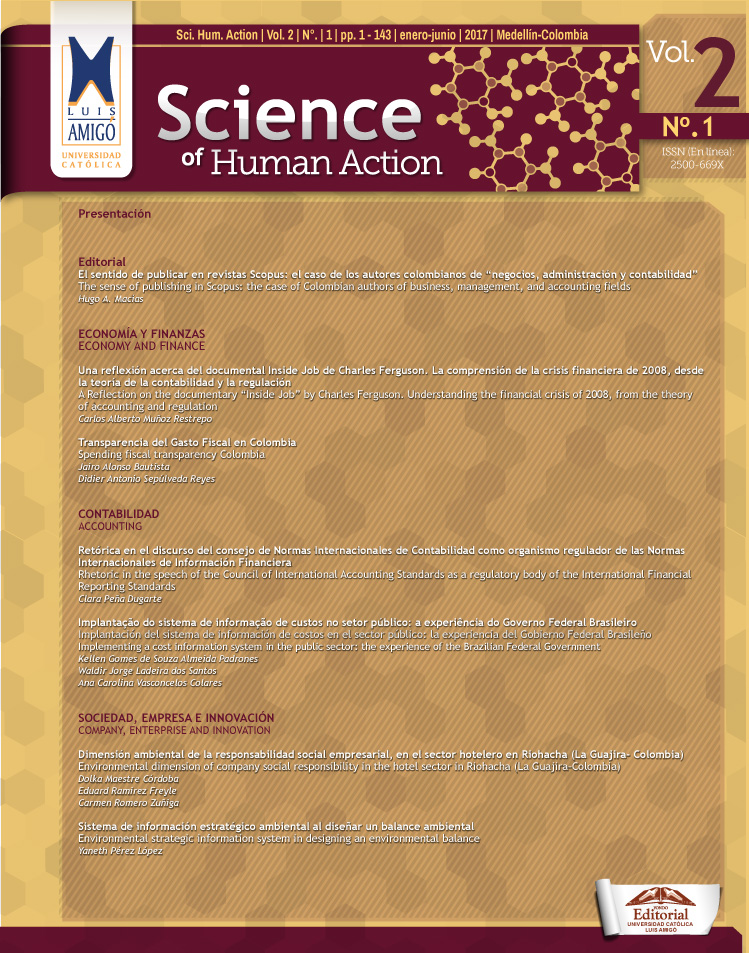A Reflection on the documentary “Inside Job” by Charles Ferguson Understanding the financial crisis of 2008 from the Theory of Accounting and Regulation
DOI:
https://doi.org/10.21501/2500-669X.2320Keywords:
Accounting Theory, financial crisis, accounting regulation, economic globalization.Abstract
The current reflection emerges from the pedagogical motivation to interpret real phenomena of the global economy, such as the 2008 crisis, from theoretical benchmarks like those by Macintosh (2000), elements of the Onion Model Reality Mattessich (2003) and specific aspects of the Regulation Theory (Mitnick, 2002). We want to find an approach from these theoretical constructs, socialized on high-impact journals to students of Accounting Sciences, so that they relate their great academic potential. The paper starts by revealing the conditions that led to the crisis, according to Inside Job documentary, where phenomena such as deregulation of the financial economy are showed up, and the capture of the political system. Subsequently, it is addressed how through “falsification” of the reality allowed by accounting signs, according to Macintosh, the institutional conditions previously described for the creation of debt instruments are exploited. Finally, some consequences that derived from the well-known crisis are stated, in order to close with some lessons.Downloads
References
Bolsa de Valores de Colombia. (2008). Derivados Financieros (en línea). Recuperado de http://www.bvc.com.co/pps/tibco/portalbvc/Home/Mercados/descripciongeneral/derivados?action=dummy
BusinessDictionary.com. (2017). Chief executive officer. Obtenido de http://www.businessdictionary.com/definition/chief-executive-officer-CEO.html
Ferguson, Ch. (Productor y Director). (2010). Inside Job [Película]. Estados Unidos: Charles Ferguson Audrey Marrs productores.
Macintosh, N. (2000). Accounting as simulacrum and hyperreality: perspectives on income and capital. Accounting, Organization and society, (25) 13-50.
Mattessich, R. (2003). La Representación Contable y el Modelo de Capas-Cebolla de la Realidad: Una Comparación con las `Ordenes de Simulacro’ de Baudrillard y su Hiperrealidad (en línea). AECA Monografía Especial.
Mitnick, B. (2002). La economía política de la regulación. Méjico Fondo de la Cultura Económica.
Muñoz Restrepo, C. (2014). La relación de referencia y el signo contable. II Encuentro Nacional de Pensamiento Contable Universidad de Manizales.
Raghuram G. Rajan, 2005. “ ¿El desarrollo financiero ha hecho que el mundo sea más riesgoso? “, Proceedings–Economic Policy Symposium–Jackson Hole , Banco de la Reserva Federal de Kansas City, edición Aug, páginas 313-369.
Downloads
Published
How to Cite
Issue
Section
License
PUBLICATIONS POLICY
• The author must send completed the declaration of transfer of economic rights and declaration of conflicts of interest, which will be provided by the management of the magazine. This document indicates the originality of the article, which is not published in another medium and that is not simultaneously postulated in another journal.
• The author will transfer all rights to the article to the journal Science Of Human Action.
• Once the evaluation of the article has begun, the authors agree not to withdraw it until the end of the process.
• The Science Of Human Action journal will submit the articles received for initial evaluation by the Editorial Committee, in case the Committee finds the material pertinent, it will be evaluated by two anonymous referees who will determine if it is publishable. If one referee approves and the other rejects it, a third party will be appointed.
• The address of Science Of Human Action will answer within a maximum of three (3) days about the receipt of the contribution received from the author.
• Printed items will not be received. All the proponents will have to send their writings through the e-mail of the magazine.
• Partial versions of the text will not be received, that is, those that are not structurally adjusted to the type of article.
• Once the article is sent, it is understood that the author authorizes the publication of these data.
• The reception of articles does not imply an obligation to publish them. The authors are directly responsible for the ideas, judgments and opinions expressed in the articles; in such a way that the content does not compromise the thinking of the Editorial Committee or the Institution.
• Once the article is submitted, it is understood that the author authorizes the publication of the data corresponding to the author's note.
• This is an open access journal that does not charge authors for either the editorial process or the publication. All costs of editorial production are assumed by the Luis Amigó Catholic University.
ETHICS OF PUBLICATION
• The Editorial Committee, by virtue of transparency in the processes, will ensure the academic quality of the journal.
• Causes of rejection are considered: plagiarism, adulteration, invention or falsification of content and author data, which are not original and unpublished.
• In no case, the journal's management will require the author to cite it or publish articles with conflicts of interest.
• If once the article is published: 1) the author discovers substantive errors that threaten the quality or scientificity, may request its removal or correction. 2) If a third party detects the error, it is the obligation of the author to retract immediately and proceed to the public removal or correction.


